外研版(2019) 必修 第一册 Unit 1 A new start Understanding ideas—读思·发展思维品质PPT(共65张ppt)
文档属性
| 名称 | 外研版(2019) 必修 第一册 Unit 1 A new start Understanding ideas—读思·发展思维品质PPT(共65张ppt) |
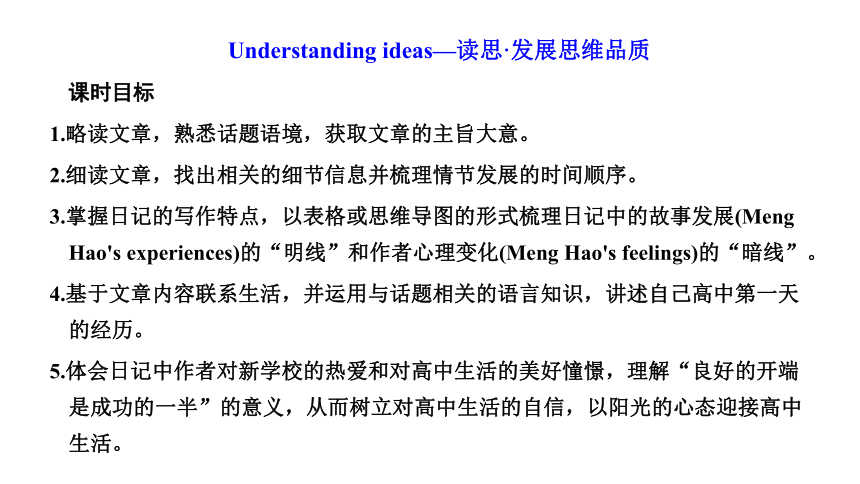
|
|
| 格式 | zip | ||
| 文件大小 | 1.0MB | ||
| 资源类型 | 教案 | ||
| 版本资源 | 外研版(2019) | ||
| 科目 | 英语 | ||
| 更新时间 | 2022-12-13 00:00:00 | ||
图片预览

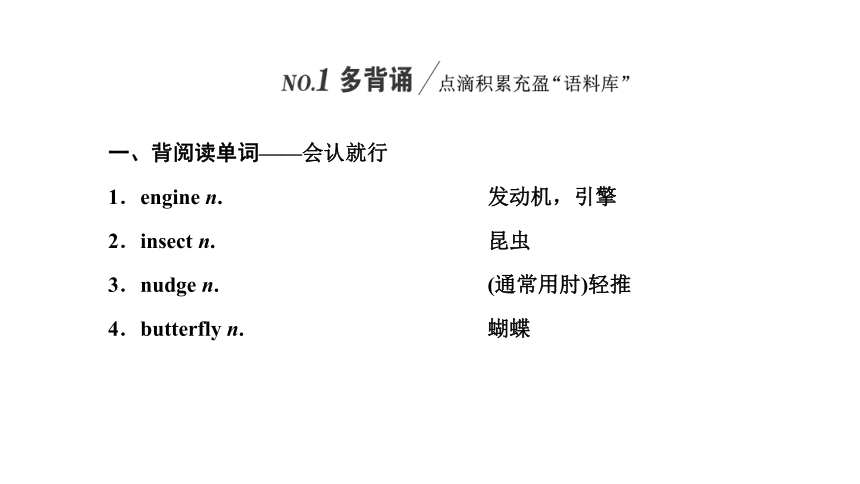
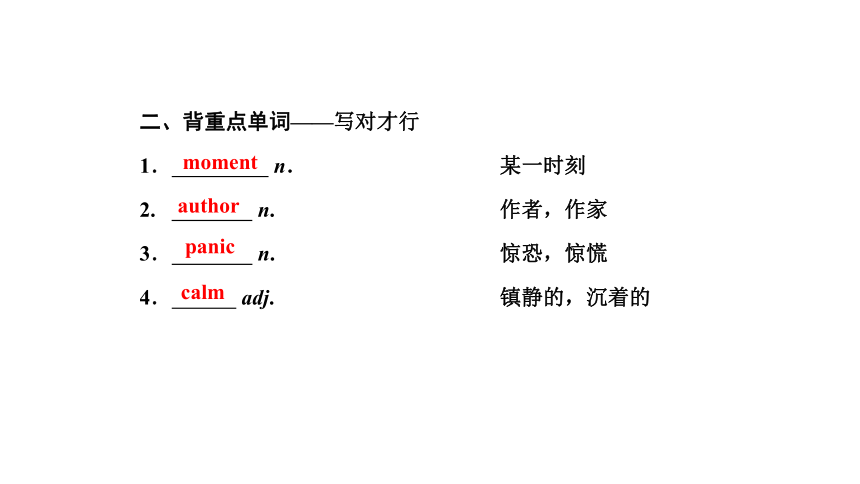
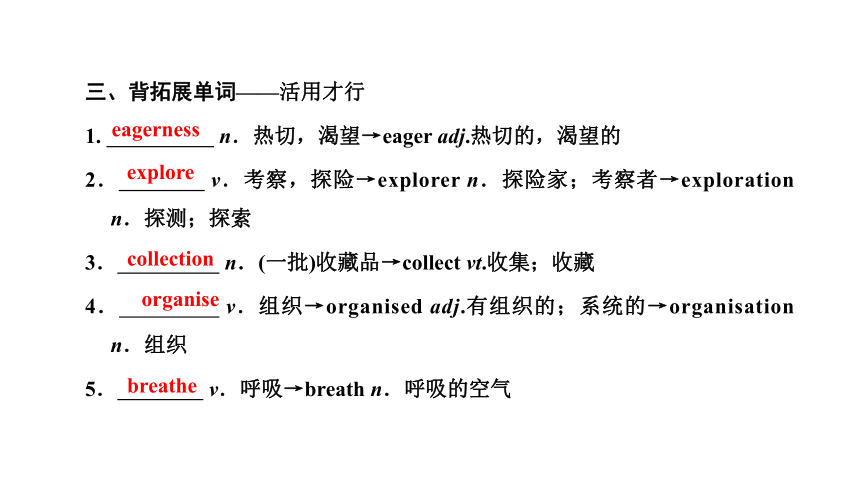
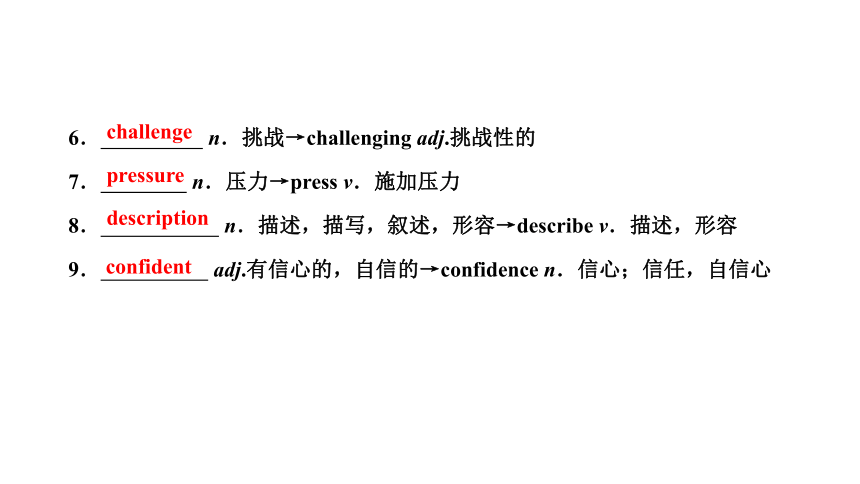
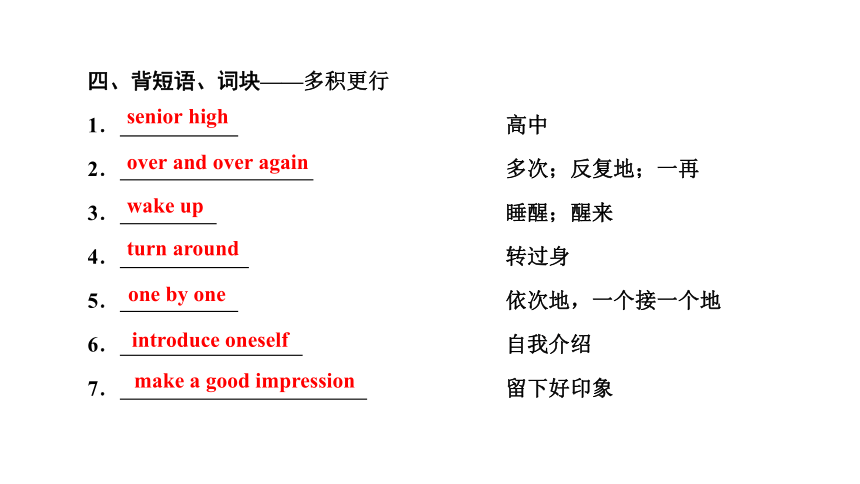
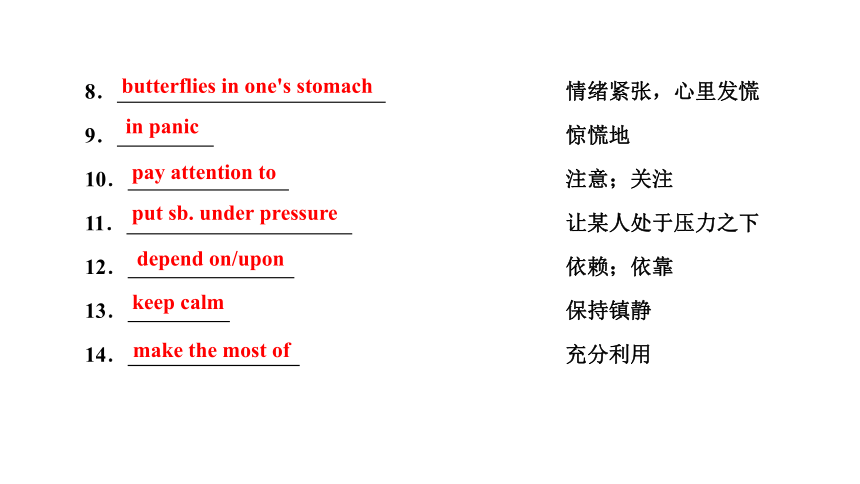
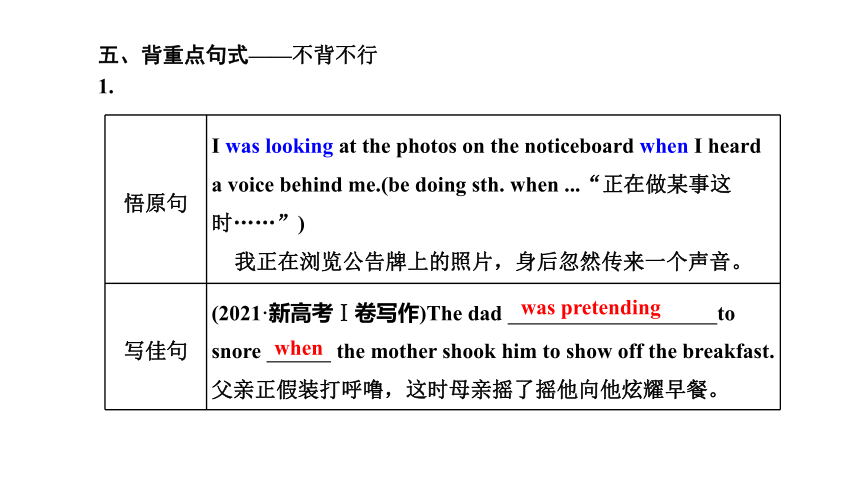
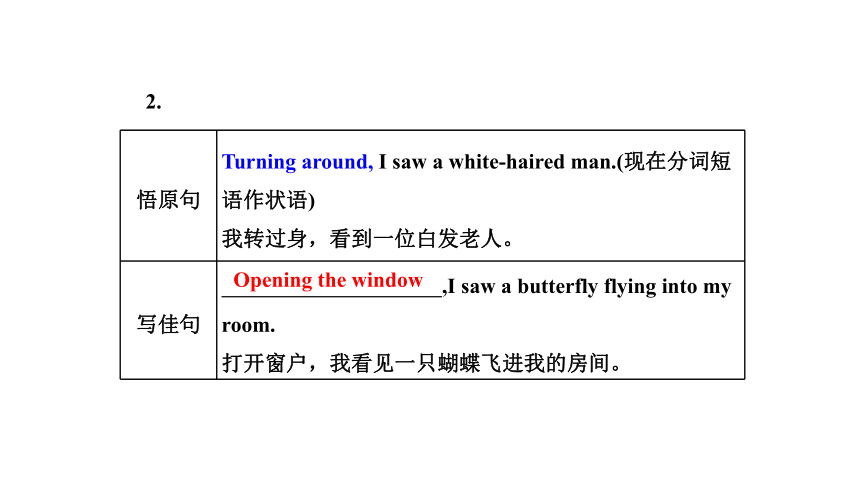
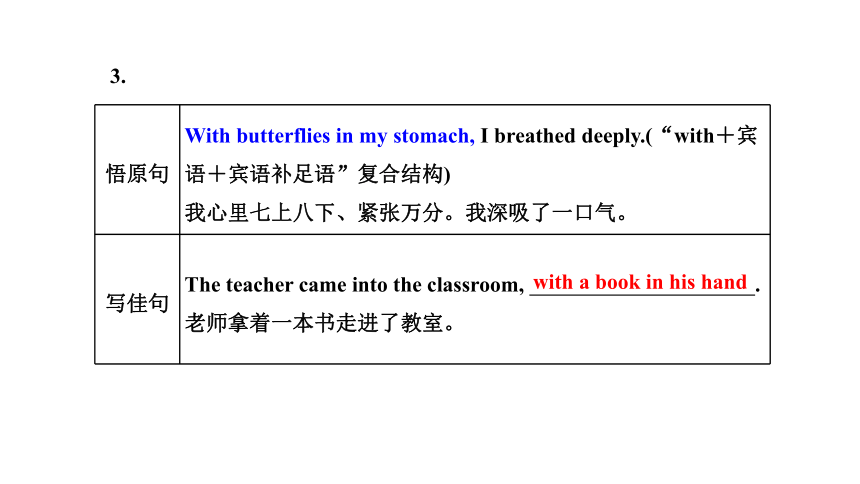
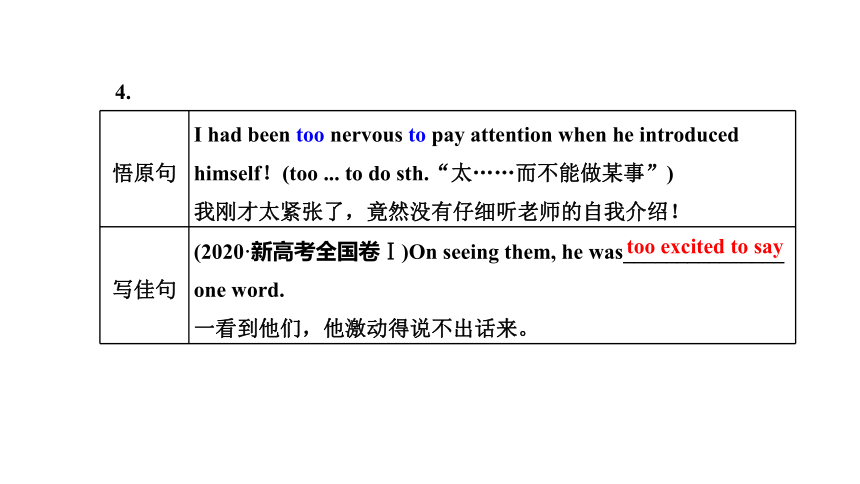
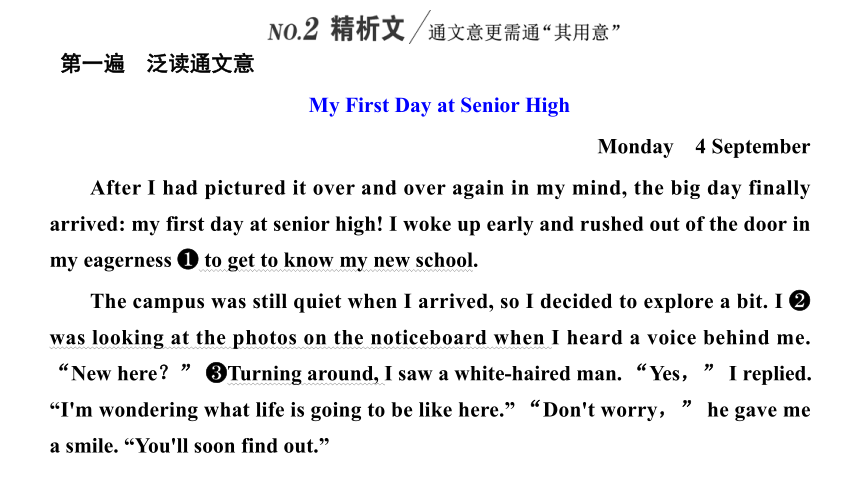
文档简介
(共65张PPT)
Understanding ideas—读思·发展思维品质
课时目标
1.略读文章,熟悉话题语境,获取文章的主旨大意。
2.细读文章,找出相关的细节信息并梳理情节发展的时间顺序。
3.掌握日记的写作特点,以表格或思维导图的形式梳理日记中的故事发展(Meng Hao's experiences)的“明线”和作者心理变化(Meng Hao's feelings)的“暗线”。
4.基于文章内容联系生活,并运用与话题相关的语言知识,讲述自己高中第一天的经历。
5.体会日记中作者对新学校的热爱和对高中生活的美好憧憬,理解“良好的开端是成功的一半”的意义,从而树立对高中生活的自信,以阳光的心态迎接高中生活。
一、背阅读单词——会认就行
1.engine n. 发动机,引擎
2.insect n. 昆虫
3.nudge n. (通常用肘)轻推
4.butterfly n. 蝴蝶
二、背重点单词——写对才行
1. n. 某一时刻
2. n. 作者,作家
3. n. 惊恐,惊慌
4. adj. 镇静的,沉着的
moment
author
panic
calm
三、背拓展单词——活用才行
1. n.热切,渴望→eager adj.热切的,渴望的
2. v.考察,探险→explorer n.探险家;考察者→exploration n.探测;探索
3. n.(一批)收藏品→collect vt.收集;收藏
4. v.组织→organised adj.有组织的;系统的→organisation n.组织
5. v.呼吸→breath n.呼吸的空气
eagerness
explore
collection
organise
breathe
6. n.挑战→challenging adj.挑战性的
7. n.压力→press v.施加压力
8. n.描述,描写,叙述,形容→describe v.描述,形容
9. adj.有信心的,自信的→confidence n.信心;信任,自信心
challenge
pressure
description
confident
四、背短语、词块——多积更行
1. 高中
2. 多次;反复地;一再
3. 睡醒;醒来
4. 转过身
5. 依次地,一个接一个地
6. 自我介绍
7. 留下好印象
senior high
over and over again
wake up
turn around
one by one
introduce oneself
make a good impression
8. 情绪紧张,心里发慌
9. 惊慌地
10. 注意;关注
11. 让某人处于压力之下
12. 依赖;依靠
13. 保持镇静
14. 充分利用
butterflies in one's stomach
in panic
pay attention to
put sb. under pressure
depend on/upon
keep calm
make the most of
五、背重点句式——不背不行
1.
悟原句 I was looking at the photos on the noticeboard when I heard a voice behind me.(be doing sth. when ...“正在做某事这时……”)
我正在浏览公告牌上的照片,身后忽然传来一个声音。
写佳句 (2021·新高考Ⅰ卷写作)The dad to snore the mother shook him to show off the breakfast.
父亲正假装打呼噜,这时母亲摇了摇他向他炫耀早餐。
was pretending
when
2.
悟原句 Turning around, I saw a white-haired man.(现在分词短语作状语)
我转过身,看到一位白发老人。
写佳句 ,I saw a butterfly flying into my room.
打开窗户,我看见一只蝴蝶飞进我的房间。
Opening the window
3.
悟原句 With butterflies in my stomach, I breathed deeply.(“with+宾语+宾语补足语”复合结构)
我心里七上八下、紧张万分。我深吸了一口气。
写佳句 The teacher came into the classroom, .
老师拿着一本书走进了教室。
with a book in his hand
4.
悟原句 I had been too nervous to pay attention when he introduced himself!(too ... to do sth.“太……而不能做某事”)
我刚才太紧张了,竟然没有仔细听老师的自我介绍!
写佳句 (2020·新高考全国卷Ⅰ)On seeing them, he was_______________ one word.
一看到他们,他激动得说不出话来。
too excited to say
第一遍 泛读通文意
My First Day at Senior High
Monday 4 September
After I had pictured it over and over again in my mind, the big day finally arrived: my first day at senior high! I woke up early and rushed out of the door in my eagerness to get to know my new school.
The campus was still quiet when I arrived, so I decided to explore a bit. I was looking at the photos on the noticeboard when I heard a voice behind me. “New here?” Turning around, I saw a white-haired man. “Yes,” I replied. “I'm wondering what life is going to be like here.” “Don't worry,” he gave me a smile. “You'll soon find out.”
How true these words were! When my English teacher stepped into the classroom, I was surprised to see the same man I had met earlier.
“Good morning, everyone. Before we start, please come to the front one by one and introduce yourself to the class. I'll go first ...”
“What?!” I tried to turn on my brain but the engine just wouldn't start. “I should say my name, of course. But what else What could I say to make a good first impression Something about my insect collection, perhaps.” I was organising my words in my head when the girl next to me gave me a nudge. “It's your turn!”
With butterflies in my stomach, I breathed deeply. “Hi, I'm Meng Hao.” Everyone started laughing. I looked at them in panic. “Nice to know we share the same name,” said my new teacher. I had been too nervous to pay attention when he introduced himself! Although I was embarrassed, his words made me a lot more relaxed!
When we had all introduced ourselves, Mr Meng said, “Well done, everyone! I know this isn't easy for many of you. But this is just the kind of thing you are going to face at senior high. Challenges like this might sometimes put you under pressure. But it all depends on what you do. Keep calm and be prepared. That way, you'll make the most of your time at senior high.”
People say, “Well begun, half done.” I guess this was a good beginning to my new school life.
[参考译文]
我的高中第一天
9月4日星期一
我在脑海中进行了无数次的想象之后,如今这一天终于来了:我高中生活的第一天!我一大早就起床冲出了家门,迫不及待地想了解我的新学校。
[句式释解]
句 to get to ...为动词不定式短语作目的状语。
我来到学校时,四周还是一片寂静,我决定四处探索一番。我正在浏览公告牌上的照片,身后忽然传来一个声音:“你是新生吗?”我转过身,看到一位白发老人。“是的,”我答道,“我正在想这里的生活将是怎么样的。”“别担心,”他对我微微一笑,“你很快就会知道了。”
[句式释解]
句 be doing ... when ...意为“正在做……这时……”。
句 Turning around意为“转过身”,此处为现在分词短语作时间状语。
这话说得真是太对了。当我的英语老师走进教室时,我惊讶地发现,他就是我之前遇到的那位老人。
“大家早上好。开始上课前,请大家依次到前面来向全班介绍一下你自己。我先来……”
“什么?!”我试图让大脑运转起来,可引擎怎么就是无法发动呢。“我肯定得先介绍我的名字。还有呢?我该说些什么才能给别人留下个不错的第一印象呢?也许可以说说我收集昆虫标本的事。”我正忙着在脑海中组织语言,坐在我旁边的女孩轻轻推了我一下:“轮到你了!”
我心里七上八下、紧张万分。我深吸了一口气说:“大家好,我叫孟浩。”大家一下子哄笑起来,我惊慌失措地盯着他们。“很高兴我们同名啊。”我的新老师说。我刚才太紧张了,竟然没有仔细听老师的自我介绍!尽管有些尴尬,老师的话还是让我放松了很多!
[句式释解]
句 此处为with复合结构:“with+名词+介词短语”,在句中作状语。
句 too ... to do sth.意为“太……而不能做某事”。
句 although引导让步状语从句,意为“虽然;尽管”。
我们都介绍完后,孟老师说:“大家都做得很好!我知道这对你们很多人来说并不容易,但这种情况正是大家在高中阶段将要面对的。类似的挑战有时可能会让大家倍感压力,但是一切都取决于你自己的努力。大家要时刻保持冷静,做好准备,这样就可以充分利用高中的时光了。”
常言道:“好的开始是成功的一半。”我想,我的高中生活开了一个好头。
[句式释解]
句 这是一个谚语,意为“好的开始是成功的一半”。
第二遍 精读提素养
步骤一|先明文章主旨大意,知写了什么
What is the theme of the text about
A.Meng Hao's feelings.
B.Meng Hao's experiences on the first day at senior high.
C.Meng Hao's English teacher.
D.Meng Hao's new senior high.
答案:B
步骤二|再逐段精读文章,看怎样写的
阅读文章第1~3段,完成下列题目
1.文意的理解
(1)Write T (true) or F (false).
①I had taken many pictures of my new school before I registered it. ( )
②I was very eager to know my new school. ( )
③The white-haired man I met on campus was my new English teacher. ( )
F
T
T
(2)What can we learn from the first three paragraphs
A.There was no student studying in the school at that time.
B.I was very nervous when the white-haired man spoke to me.
C.I arrived at the new school earlier than others.
D.When I saw my English teacher, I was excited.
答案:C
2.表达的技巧
(1)第一段最后一句中并列谓语woke up和rushed out的使用恰到好处,尤其是该句中的副词early和介词短语in my eagerness的使用,形象地写出了作者第一天上高中迫不及待地想了解新学校的急切心情。
试补全下面的句子:
He to the school, leaving the breakfast untouched.
他起晚了,匆匆赶到学校,早饭连碰都没碰。
got up late and hurried
(2)第二段第二句使用了句型“was doing ... when ...(正在做……这时……)”,形象地表达出了当时作者在聚精会神地浏览公告牌上的照片的同时听到了身后的说话声。
试翻译下面的句子:
我正在看电视,这时突然有人敲门。
阅读文章第4~6段,完成下列题目
1.文意的理解
(1)How did my new teacher ask us to introduce ourselves
I was watching TV when someone knocked at the door.
One by one.
(2)What did the author want to say to make a good first impression
(3)Why did the classmates laugh
Something about his insect collection.
Because the author shared the same name with the new teacher.
2.表达的技巧
(1)第五段“I tried to turn on my brain but the engine just wouldn't start.”一句中的turn on是固定搭配,本意为“启动(机器);打开(设备);接通(电流、煤气、水等)”,此处是用启动机器来比喻动脑思考,使语言更加生动、形象。本句中的“the engine just wouldn't start”也是同样的用法。
试翻译下面的句子:
A word and a stone let go cannot be recalled.
说出去的话就像抛出去了的石子,是收不回的。
(2)第六段最后一句中的embarrassed一词形象地表达出了作者当时的尴尬,而relaxed一词则又表达出老师的话让自己的心情轻松了起来。这两个词均以“-ed”结尾,常用来修饰人,表示人的感受或心理状态;而embarrassing和relaxing是以“-ing”结尾,常用来修饰事或物,意为“令人……的”。
选词填空:embarrassed, embarrassing
That was such an question that it made me ,not knowing how to answer it.
embarrassing
embarrassed
阅读文章第7、8段,完成下列题目
1.文意的理解
(1)Mr Meng gave the students some advice on how to deal with challenges EXCEPT .
A.Putting you under pressure
B.Keeping calm
C.Being prepared
D.Making the most of the time
答案:A
(2)What's your understanding of the saying “Well begun, half done”?
It means that if you have a good beginning, your chance of success
is greatly improved.
2.表达的技巧
谚语是指广泛流传于人民群众之间的、形式相对稳定的、简练而生动的固定语句,它总结了人民群众在劳动和生活等方面的经验智慧,一定程度上反映了自然界和人类社会的客观规律,具有教诲和启示的积极意义。文章最后一段使用了谚语“Well begun, half done.”,意思为:好的开始是成功的一半。这也表达出了作者的美好愿望。
试翻译下列谚语:
①Where there is a will, there is a way.
②Actions speak louder than words.
③No pain, no gain.
④True blue will never strain.
有志者,事竟成
事实胜于雄辩。
不劳无获。
真金不怕火炼。
步骤三|读后理层次结构,
析有何逻辑
本篇文章为日记。日记是记叙文性质的应用文,用来记录日常的事情、经历、感想等内容,常以时间顺序展开。本文以第一人称记叙了新生“孟浩”在高中的第一天的经历及感受。文章按照时间顺序进行写作,分别叙述了“去上学前”“到达学校后”“英语课上”“英语课后”等四个阶段的经历(明线);在叙述的过程中充分表达了“我”的情感(暗线),明暗线交织进行,生动形象地展示了“我”在高中生活第一天所经历的挑战与信心的收获。
阅读技巧:英文记叙文的主旨大意题通常出现在文章的最后一两段,尤其出现在含有议论的部分。在做阅读理解类题目时,可利用这一特点快准解题。
步骤四|最后知选文意图,思有何价值
树立“自信”的意识
自信对我们的生活非常重要。自信给人以力量,给人以快乐。正是有了自信,人们才充满了睿智,心中才升腾起无尽的希望。文章最后一段:People say, “Well begun, half done.” I guess this was a good beginning to my new school life.体现了作者对高中学习生活的美好憧憬和对未来的信心。
请体会并记住下面的句子:
①Confidence in yourself is the first step on the road to success.
自信是走向成功的第一步。
②All things are difficult before they are easy.
凡事总是由难而易。
③Nothing in the world is difficult for one who sets his mind to it.
世上无难事,只怕有心人。
第一板块 单词和短语——点点清
1.With butterflies in my stomach, I breathed deeply.
我心里七上八下、紧张万分。我深吸了一口气。
★breathe v.呼吸
[用法感知]
①Humans breathe in oxygen and breathe out carbon dioxide, which is a normal reaction.
人类吸入氧气,呼出二氧化碳,这是一种正常的反应。
②The hunter held his breath when he saw a tiger looking at him over there.
当猎人看到那边有只老虎在看他时,他屏住气不敢呼吸。
③They reached the company out of breath, only to learn that they were fired.
他们上气不接下气地赶到公司,结果得知他们被解雇了。
归纳点拨 (1)breathe in/out 吸气/呼气
breathe deeply 深呼吸,深吸一口气
(2)breath n. 呼吸;气息
take a deep breath 深吸一口气
hold one's breath 屏住呼吸
out of breath 上气不接下气;气喘吁吁
轻巧识记
[应用融会]
(1)单句语法填空
④He took a deep (breathe) and jumped into the swimming pool.
⑤When I hurried to school, I was almost of breath.
(2)句型转换
⑥He breathed deeply before speaking again.
→He before speaking again.
breath
out
took a deep breath
2.Everyone started laughing. I looked at them in panic.
大家一下子哄笑起来,我惊慌失措地盯着他们。
★panic n.惊恐,惊慌v.(使)恐慌,(使)惊慌失措
[用法感知]
①Office workers fled in panic as the fire happened.
当火灾发生时,办公室人员惊慌地逃出来。
②The children got into a panic when they realized they were lost.
当孩子们意识到迷路的时候,他们惊慌起来。
③The war panicked many people into leaving the country.
战争使许多人惊慌地离开这个国家。
[归纳点拨]
(1)get into a panic 陷入恐慌(表示动作)
be in (a) panic 惊慌失措地;惊慌地(表示状态)
(2)panic sb. into doing sth. 使某人惊慌失措地做某事
[应用融会] (单句语法填空/完成句子)
④The children ran away panic when they broke the neighbor's window.
⑤I (panic) when I saw smoke coming out of the engine.
⑥She got a panic when she thought she'd forgotten the tickets.
⑦The sound from the building.
这种声音使得很多人惊慌失措地逃离了大楼。
[名师点津] panic用作动词时,其过去式、过去分词和现在分词分别为:panicked, panicked, panicking。
in
panicked
into
panicked many people into escaping
3.Challenges like this might sometimes put you under pressure.
类似的挑战有时可能会让大家倍感压力。
★challenge n.挑战vt.挑战;向……挑战
[用法感知]
①(以文化人助写作)Doing small things well contributes to building up our confidence and helping us meet bigger challenges in the future.
把小事做好有助于增强我们的自信心并帮助我们迎接未来更大的挑战。
②I also developed practical skills which are necessary for me to face future challenges.
我还发展了我面对未来挑战所必需的实际技能。
③He challenged me to play another tennis game.
他向我挑战要我跟他再打一场网球比赛。
[归纳点拨]
(1)face a challenge 面对挑战
meet the challenge of ... 迎接……的挑战
accept/take up a challenge 接受挑战
(2)challenge sb. to sth. 向某人挑战某事
challenge sb. to do sth. 向某人挑战做某事
(3)challenging adj. 挑战性的;考验能力的
[应用融会] (单句语法填空/完成句子)
④The present world is full of (challenge) as well as opportunities.
⑤So (challenge) is the task that no one wants to take on it.
⑥The school challenged us a football match.
⑦Let's work together to .
让我们共同工作,迎接明天的挑战。
[名师点津] challenge用作动词时,本身已含“向……,对……”的意义,因而表示“向某人挑战”时,应用challenge sb., challenge后面不要再加多余的to。
challenges
challenging
to
meet the challenge of tomorrow
4.Keep calm and be prepared.
大家要时刻保持冷静,做好准备。
★calm adj.镇静的,沉着的;平静的v.(使)平静;(使)镇静
[用法感知]
①(以文化人助写作)Remember when life's path is steep, to stay calm.
记住,当人生之路陡峭之时,要保持沉着。
②The police found that it was difficult to calm down the angry crowd.
警方发现很难使愤怒的人群平静下来。
轻巧识记
归纳点拨 keep/stay/remain calm 保持镇静
calm down (使)平静下来,(使)镇定下来
[应用融会] (单句语法填空)
③He took a deep breath to calm (he) down.
④After I calmed ,I played football better.
[易混辨析] calm, quiet, still, silent
calm 指天气时表示“平静的,无风的”;指海洋时表示“风平浪静的”;指人的心境、性情时,表示“镇静的,沉着的”
quiet 指人时表示性格安静或性情稳定;用于环境时指没有干扰活动、没有喧闹声的寂静状态
still 可以指环境的安静;也可以指姿态保持一动不动,不能用来表示心理上的平静
silent 寂静的,沉默的;不发音的,多指人默不作声
himself
down
选词填空(calm, quiet, still, silent)
⑤When facing danger, one should keep ;when taken photos, one should keep when someone else is asleep,one should keep when in class, one shouldn't keep about the teacher's questions.
calm
still
quiet
silent
第二板块 句式和语法——句句通
1.I was looking at the photos on the noticeboard when I heard a voice behind me.
我正在浏览公告牌上的照片,身后忽然传来一个声音。
[归纳点拨]
be doing ... when ... 意为“正在做……这时……”。when 在句中是并列连词,表示“就在这时/那时”,说明在某个时刻的行为或状态,相当于 and at that/this time。when用作并列连词的句型还有:
be about to do/be on the point of doing ... when ...正要做……这时(突然)……
had just/hardly done ... when ...刚做了……这时……
[应用融会] (单句语法填空/完成句子)
①I was about (go) shopping when an unexpected visitor came.
②I was on the point of (telephone) him when his letter arrived.
③I was driving down to London I suddenly found that I was on the wrong road.
④I my test paper ,announcing the exam was over.
我刚完成试卷,这时宣告考试结束的铃声响了。
to go
telephoning
when
had just finished
when the bell rang
2.“Don't worry,” he gave me a smile.
“别担心,”他对我微微一笑。
[感知将学语法]
he gave me a smile是一个简单句,其句型结构为“主语+及物动词+间接宾语+直接宾语”。体会下面句子:
①I offered him a timely help. (间接宾语为him,直接宾语为a timely help)
→I offered a timely help to him.
我给他提供了及时的帮助。
②I bought her a dress. (间接宾语为her,直接宾语为a dress)
→I bought a dress for her.
我给她买了一件晚礼服。
③Please bring me several English books tomorrow. (间接宾语为me,直接宾语为several English books)
→Please bring several English books to me tomorrow.
明天请给我带几本英语书来。
3.With butterflies in my stomach, I breathed deeply.
我心里七上八下、紧张万分。我深吸了一口气。
[归纳点拨]
With butterflies in my stomach是由“with+名词+介词短语”构成的with复合结构,在句中作状语。with复合结构的构成为“with+宾语+宾语补足语”,在句中作状语,表示原因、伴随、条件等。另外,with 复合结构还可用作后置定语。with复合结构的常见形式有:
(1)with+名词/代词+prep.(表示某种方式)
(2)with+名词/代词+adj./adv.(表示某种状态)
(3)with+名词/代词+to do(表示将要发生的动作)
(4)with+名词/代词+doing(表示正在发生的动作或主动的动作)
(5)with+名词/代词+done(表示已经完成的动作或被动的动作)
[应用融会]
(1)单句语法填空/完成句子
①She had to walk home with her bike (steal).
②With the boy (lead) us, we had no difficulty finding Alice's home.
③With a lot of homework (do), little Tom could not play with his classmates.
④I like to sleep with .
我喜欢开着窗户睡觉。
stolen
leading
to do
the windows open
(2)句式升级(用with 复合结构)
⑤As the College Entrance Examination is drawing near, some students are getting more and more nervous.
→ some students are getting more and more nervous.
[名师点津]
(1)在with复合结构中,现在分词作宾语补足语时强调动作正在进行,且宾语与宾语补足语之间是逻辑上的主谓关系。
(2)及物动词的过去分词作宾语补足语时表示被动与完成,且宾语补足语与宾语之间是逻辑上的动宾关系;不及物动词的过去分词作宾语补足语时,只表示动作已完成。
(3)动词不定式作宾语补足语时表示一个还未发生的动作。
With the College Entrance Examination drawing near
Ⅰ.单词拼写
1.I couldn't hide my (渴望) to get back home.
2.Take it easy; you'd better go slowly and (呼吸) deeply.
3.There was something wrong with the (发动机) of the car, so we had to go to the park by taxi.
4.The best way to (考察) the island is to hire a car.
5.No matter what happens, you must be (镇静的).
eagerness
breathe
engine
explore
calm
6.The secret to happiness is to keep setting yourself new (挑战).
7.We will attend a meeting (组织) by the Students' Union tonight.
8.She was unable to attend because of the (压力) of work.
9.These days strange things happened frequently in the small village, which caused a (惊慌) among the villagers.
10.This (时刻) will live in our memories for many years to come.
challenges
organised
pressure
panic
moment
Ⅱ.单句语法填空
1.She has every (confident) in her students' abilities.
2.The audience held their (breathe) to see who would win the gold medal.
3.The child was crying, so the nurse had got to give him some toys to calm him .
4.The art (collect) was his life's work.
confidence
breath
down
collection
5.The book gives a short (describe) of the city.
6.The owner of the shop is always eager (make) every customer happy.
7.The police's arrival (panic) the thief into running away.
8.After graduation, the volunteers prefer to take part in (challenge) social activities.
description
to make
panicked
challenging
Ⅲ.选词填空
1.Choosing the right bike what you want to use it for.
2.Little Tom was very nervous in front of so many strangers, so he ____________
and ran to his mother.
3.Every student should what he has to achieve what he wants.
turn around, keep calm, pay attention to, depend on, one by one, over and over again, wake up, in panic, make the most of, under pressure
depends on
turned around
make the most of
4.The only way to learn the lines by heart is to say them to yourself .
5.They are talking in a whisper in order not to the sleeping baby.
6.The guests in the hotel ran out when the fire broke out.
7.The film was so boring that soon all the children in the cinema began to feel bored with it and they went out .
8.You must no matter what happens.
9.This question is very important so I hope all of you it.
10.Some people work better .
over and over again
wake up
in panic
one by one
keep calm
pay attention to
under pressure
Ⅳ.完成句子
1.I about Tu Youyou my mother entered.
我正在读着屠呦呦的故事,这时我妈妈进来了。
2.I think the kids to school this week.
我想这周该轮到我开车送孩子们上学了。
3.He is right from wrong.
他太小,还分不清是非。
was reading the story
when
it's my turn to drive
too young to know
4. they couldn't help crying.
听到这个坏消息,他们情不自禁地哭了起来。
5.On the first day of my first grade, I stood by the door .
在一年级的第一天,我站在门口,心里七上八下、紧张万分。
6. it is to fly a kite here!
在这里放风筝真有趣啊!
Hearing the bad news
with butterflies in my stomach
What great fun
Ⅴ.课文语法填空
Meng Hao got up early and 1. (rush) to his new school. When he arrived, 2. campus was still quiet, so he decided 3. (explore) it. When he was looking at the 4. (photo) on the noticeboard, he met a white-haired man. Later, he was 5. (surprise) to find the same man 6. was his English teacher. During the English class, Meng Hao was nervous about 7. ___________(introduce) himself in front of the class. Because he had the same name as his teacher, the students burst out laughing. Thanks to his teacher's words, he felt a lot more 8. (relax). The teacher also advised everyone to keep calm and prepare 9. (they) for the unknown. Meng Hao thought he had a positive attitude 10. his new school life.
rushed
the
to explore
photos
urprised
who
introducing
relaxed
themselves
to/towards
“课时跟踪检测”见“课时跟踪检测(一)”
(单击进入电子文档)
Understanding ideas—读思·发展思维品质
课时目标
1.略读文章,熟悉话题语境,获取文章的主旨大意。
2.细读文章,找出相关的细节信息并梳理情节发展的时间顺序。
3.掌握日记的写作特点,以表格或思维导图的形式梳理日记中的故事发展(Meng Hao's experiences)的“明线”和作者心理变化(Meng Hao's feelings)的“暗线”。
4.基于文章内容联系生活,并运用与话题相关的语言知识,讲述自己高中第一天的经历。
5.体会日记中作者对新学校的热爱和对高中生活的美好憧憬,理解“良好的开端是成功的一半”的意义,从而树立对高中生活的自信,以阳光的心态迎接高中生活。
一、背阅读单词——会认就行
1.engine n. 发动机,引擎
2.insect n. 昆虫
3.nudge n. (通常用肘)轻推
4.butterfly n. 蝴蝶
二、背重点单词——写对才行
1. n. 某一时刻
2. n. 作者,作家
3. n. 惊恐,惊慌
4. adj. 镇静的,沉着的
moment
author
panic
calm
三、背拓展单词——活用才行
1. n.热切,渴望→eager adj.热切的,渴望的
2. v.考察,探险→explorer n.探险家;考察者→exploration n.探测;探索
3. n.(一批)收藏品→collect vt.收集;收藏
4. v.组织→organised adj.有组织的;系统的→organisation n.组织
5. v.呼吸→breath n.呼吸的空气
eagerness
explore
collection
organise
breathe
6. n.挑战→challenging adj.挑战性的
7. n.压力→press v.施加压力
8. n.描述,描写,叙述,形容→describe v.描述,形容
9. adj.有信心的,自信的→confidence n.信心;信任,自信心
challenge
pressure
description
confident
四、背短语、词块——多积更行
1. 高中
2. 多次;反复地;一再
3. 睡醒;醒来
4. 转过身
5. 依次地,一个接一个地
6. 自我介绍
7. 留下好印象
senior high
over and over again
wake up
turn around
one by one
introduce oneself
make a good impression
8. 情绪紧张,心里发慌
9. 惊慌地
10. 注意;关注
11. 让某人处于压力之下
12. 依赖;依靠
13. 保持镇静
14. 充分利用
butterflies in one's stomach
in panic
pay attention to
put sb. under pressure
depend on/upon
keep calm
make the most of
五、背重点句式——不背不行
1.
悟原句 I was looking at the photos on the noticeboard when I heard a voice behind me.(be doing sth. when ...“正在做某事这时……”)
我正在浏览公告牌上的照片,身后忽然传来一个声音。
写佳句 (2021·新高考Ⅰ卷写作)The dad to snore the mother shook him to show off the breakfast.
父亲正假装打呼噜,这时母亲摇了摇他向他炫耀早餐。
was pretending
when
2.
悟原句 Turning around, I saw a white-haired man.(现在分词短语作状语)
我转过身,看到一位白发老人。
写佳句 ,I saw a butterfly flying into my room.
打开窗户,我看见一只蝴蝶飞进我的房间。
Opening the window
3.
悟原句 With butterflies in my stomach, I breathed deeply.(“with+宾语+宾语补足语”复合结构)
我心里七上八下、紧张万分。我深吸了一口气。
写佳句 The teacher came into the classroom, .
老师拿着一本书走进了教室。
with a book in his hand
4.
悟原句 I had been too nervous to pay attention when he introduced himself!(too ... to do sth.“太……而不能做某事”)
我刚才太紧张了,竟然没有仔细听老师的自我介绍!
写佳句 (2020·新高考全国卷Ⅰ)On seeing them, he was_______________ one word.
一看到他们,他激动得说不出话来。
too excited to say
第一遍 泛读通文意
My First Day at Senior High
Monday 4 September
After I had pictured it over and over again in my mind, the big day finally arrived: my first day at senior high! I woke up early and rushed out of the door in my eagerness to get to know my new school.
The campus was still quiet when I arrived, so I decided to explore a bit. I was looking at the photos on the noticeboard when I heard a voice behind me. “New here?” Turning around, I saw a white-haired man. “Yes,” I replied. “I'm wondering what life is going to be like here.” “Don't worry,” he gave me a smile. “You'll soon find out.”
How true these words were! When my English teacher stepped into the classroom, I was surprised to see the same man I had met earlier.
“Good morning, everyone. Before we start, please come to the front one by one and introduce yourself to the class. I'll go first ...”
“What?!” I tried to turn on my brain but the engine just wouldn't start. “I should say my name, of course. But what else What could I say to make a good first impression Something about my insect collection, perhaps.” I was organising my words in my head when the girl next to me gave me a nudge. “It's your turn!”
With butterflies in my stomach, I breathed deeply. “Hi, I'm Meng Hao.” Everyone started laughing. I looked at them in panic. “Nice to know we share the same name,” said my new teacher. I had been too nervous to pay attention when he introduced himself! Although I was embarrassed, his words made me a lot more relaxed!
When we had all introduced ourselves, Mr Meng said, “Well done, everyone! I know this isn't easy for many of you. But this is just the kind of thing you are going to face at senior high. Challenges like this might sometimes put you under pressure. But it all depends on what you do. Keep calm and be prepared. That way, you'll make the most of your time at senior high.”
People say, “Well begun, half done.” I guess this was a good beginning to my new school life.
[参考译文]
我的高中第一天
9月4日星期一
我在脑海中进行了无数次的想象之后,如今这一天终于来了:我高中生活的第一天!我一大早就起床冲出了家门,迫不及待地想了解我的新学校。
[句式释解]
句 to get to ...为动词不定式短语作目的状语。
我来到学校时,四周还是一片寂静,我决定四处探索一番。我正在浏览公告牌上的照片,身后忽然传来一个声音:“你是新生吗?”我转过身,看到一位白发老人。“是的,”我答道,“我正在想这里的生活将是怎么样的。”“别担心,”他对我微微一笑,“你很快就会知道了。”
[句式释解]
句 be doing ... when ...意为“正在做……这时……”。
句 Turning around意为“转过身”,此处为现在分词短语作时间状语。
这话说得真是太对了。当我的英语老师走进教室时,我惊讶地发现,他就是我之前遇到的那位老人。
“大家早上好。开始上课前,请大家依次到前面来向全班介绍一下你自己。我先来……”
“什么?!”我试图让大脑运转起来,可引擎怎么就是无法发动呢。“我肯定得先介绍我的名字。还有呢?我该说些什么才能给别人留下个不错的第一印象呢?也许可以说说我收集昆虫标本的事。”我正忙着在脑海中组织语言,坐在我旁边的女孩轻轻推了我一下:“轮到你了!”
我心里七上八下、紧张万分。我深吸了一口气说:“大家好,我叫孟浩。”大家一下子哄笑起来,我惊慌失措地盯着他们。“很高兴我们同名啊。”我的新老师说。我刚才太紧张了,竟然没有仔细听老师的自我介绍!尽管有些尴尬,老师的话还是让我放松了很多!
[句式释解]
句 此处为with复合结构:“with+名词+介词短语”,在句中作状语。
句 too ... to do sth.意为“太……而不能做某事”。
句 although引导让步状语从句,意为“虽然;尽管”。
我们都介绍完后,孟老师说:“大家都做得很好!我知道这对你们很多人来说并不容易,但这种情况正是大家在高中阶段将要面对的。类似的挑战有时可能会让大家倍感压力,但是一切都取决于你自己的努力。大家要时刻保持冷静,做好准备,这样就可以充分利用高中的时光了。”
常言道:“好的开始是成功的一半。”我想,我的高中生活开了一个好头。
[句式释解]
句 这是一个谚语,意为“好的开始是成功的一半”。
第二遍 精读提素养
步骤一|先明文章主旨大意,知写了什么
What is the theme of the text about
A.Meng Hao's feelings.
B.Meng Hao's experiences on the first day at senior high.
C.Meng Hao's English teacher.
D.Meng Hao's new senior high.
答案:B
步骤二|再逐段精读文章,看怎样写的
阅读文章第1~3段,完成下列题目
1.文意的理解
(1)Write T (true) or F (false).
①I had taken many pictures of my new school before I registered it. ( )
②I was very eager to know my new school. ( )
③The white-haired man I met on campus was my new English teacher. ( )
F
T
T
(2)What can we learn from the first three paragraphs
A.There was no student studying in the school at that time.
B.I was very nervous when the white-haired man spoke to me.
C.I arrived at the new school earlier than others.
D.When I saw my English teacher, I was excited.
答案:C
2.表达的技巧
(1)第一段最后一句中并列谓语woke up和rushed out的使用恰到好处,尤其是该句中的副词early和介词短语in my eagerness的使用,形象地写出了作者第一天上高中迫不及待地想了解新学校的急切心情。
试补全下面的句子:
He to the school, leaving the breakfast untouched.
他起晚了,匆匆赶到学校,早饭连碰都没碰。
got up late and hurried
(2)第二段第二句使用了句型“was doing ... when ...(正在做……这时……)”,形象地表达出了当时作者在聚精会神地浏览公告牌上的照片的同时听到了身后的说话声。
试翻译下面的句子:
我正在看电视,这时突然有人敲门。
阅读文章第4~6段,完成下列题目
1.文意的理解
(1)How did my new teacher ask us to introduce ourselves
I was watching TV when someone knocked at the door.
One by one.
(2)What did the author want to say to make a good first impression
(3)Why did the classmates laugh
Something about his insect collection.
Because the author shared the same name with the new teacher.
2.表达的技巧
(1)第五段“I tried to turn on my brain but the engine just wouldn't start.”一句中的turn on是固定搭配,本意为“启动(机器);打开(设备);接通(电流、煤气、水等)”,此处是用启动机器来比喻动脑思考,使语言更加生动、形象。本句中的“the engine just wouldn't start”也是同样的用法。
试翻译下面的句子:
A word and a stone let go cannot be recalled.
说出去的话就像抛出去了的石子,是收不回的。
(2)第六段最后一句中的embarrassed一词形象地表达出了作者当时的尴尬,而relaxed一词则又表达出老师的话让自己的心情轻松了起来。这两个词均以“-ed”结尾,常用来修饰人,表示人的感受或心理状态;而embarrassing和relaxing是以“-ing”结尾,常用来修饰事或物,意为“令人……的”。
选词填空:embarrassed, embarrassing
That was such an question that it made me ,not knowing how to answer it.
embarrassing
embarrassed
阅读文章第7、8段,完成下列题目
1.文意的理解
(1)Mr Meng gave the students some advice on how to deal with challenges EXCEPT .
A.Putting you under pressure
B.Keeping calm
C.Being prepared
D.Making the most of the time
答案:A
(2)What's your understanding of the saying “Well begun, half done”?
It means that if you have a good beginning, your chance of success
is greatly improved.
2.表达的技巧
谚语是指广泛流传于人民群众之间的、形式相对稳定的、简练而生动的固定语句,它总结了人民群众在劳动和生活等方面的经验智慧,一定程度上反映了自然界和人类社会的客观规律,具有教诲和启示的积极意义。文章最后一段使用了谚语“Well begun, half done.”,意思为:好的开始是成功的一半。这也表达出了作者的美好愿望。
试翻译下列谚语:
①Where there is a will, there is a way.
②Actions speak louder than words.
③No pain, no gain.
④True blue will never strain.
有志者,事竟成
事实胜于雄辩。
不劳无获。
真金不怕火炼。
步骤三|读后理层次结构,
析有何逻辑
本篇文章为日记。日记是记叙文性质的应用文,用来记录日常的事情、经历、感想等内容,常以时间顺序展开。本文以第一人称记叙了新生“孟浩”在高中的第一天的经历及感受。文章按照时间顺序进行写作,分别叙述了“去上学前”“到达学校后”“英语课上”“英语课后”等四个阶段的经历(明线);在叙述的过程中充分表达了“我”的情感(暗线),明暗线交织进行,生动形象地展示了“我”在高中生活第一天所经历的挑战与信心的收获。
阅读技巧:英文记叙文的主旨大意题通常出现在文章的最后一两段,尤其出现在含有议论的部分。在做阅读理解类题目时,可利用这一特点快准解题。
步骤四|最后知选文意图,思有何价值
树立“自信”的意识
自信对我们的生活非常重要。自信给人以力量,给人以快乐。正是有了自信,人们才充满了睿智,心中才升腾起无尽的希望。文章最后一段:People say, “Well begun, half done.” I guess this was a good beginning to my new school life.体现了作者对高中学习生活的美好憧憬和对未来的信心。
请体会并记住下面的句子:
①Confidence in yourself is the first step on the road to success.
自信是走向成功的第一步。
②All things are difficult before they are easy.
凡事总是由难而易。
③Nothing in the world is difficult for one who sets his mind to it.
世上无难事,只怕有心人。
第一板块 单词和短语——点点清
1.With butterflies in my stomach, I breathed deeply.
我心里七上八下、紧张万分。我深吸了一口气。
★breathe v.呼吸
[用法感知]
①Humans breathe in oxygen and breathe out carbon dioxide, which is a normal reaction.
人类吸入氧气,呼出二氧化碳,这是一种正常的反应。
②The hunter held his breath when he saw a tiger looking at him over there.
当猎人看到那边有只老虎在看他时,他屏住气不敢呼吸。
③They reached the company out of breath, only to learn that they were fired.
他们上气不接下气地赶到公司,结果得知他们被解雇了。
归纳点拨 (1)breathe in/out 吸气/呼气
breathe deeply 深呼吸,深吸一口气
(2)breath n. 呼吸;气息
take a deep breath 深吸一口气
hold one's breath 屏住呼吸
out of breath 上气不接下气;气喘吁吁
轻巧识记
[应用融会]
(1)单句语法填空
④He took a deep (breathe) and jumped into the swimming pool.
⑤When I hurried to school, I was almost of breath.
(2)句型转换
⑥He breathed deeply before speaking again.
→He before speaking again.
breath
out
took a deep breath
2.Everyone started laughing. I looked at them in panic.
大家一下子哄笑起来,我惊慌失措地盯着他们。
★panic n.惊恐,惊慌v.(使)恐慌,(使)惊慌失措
[用法感知]
①Office workers fled in panic as the fire happened.
当火灾发生时,办公室人员惊慌地逃出来。
②The children got into a panic when they realized they were lost.
当孩子们意识到迷路的时候,他们惊慌起来。
③The war panicked many people into leaving the country.
战争使许多人惊慌地离开这个国家。
[归纳点拨]
(1)get into a panic 陷入恐慌(表示动作)
be in (a) panic 惊慌失措地;惊慌地(表示状态)
(2)panic sb. into doing sth. 使某人惊慌失措地做某事
[应用融会] (单句语法填空/完成句子)
④The children ran away panic when they broke the neighbor's window.
⑤I (panic) when I saw smoke coming out of the engine.
⑥She got a panic when she thought she'd forgotten the tickets.
⑦The sound from the building.
这种声音使得很多人惊慌失措地逃离了大楼。
[名师点津] panic用作动词时,其过去式、过去分词和现在分词分别为:panicked, panicked, panicking。
in
panicked
into
panicked many people into escaping
3.Challenges like this might sometimes put you under pressure.
类似的挑战有时可能会让大家倍感压力。
★challenge n.挑战vt.挑战;向……挑战
[用法感知]
①(以文化人助写作)Doing small things well contributes to building up our confidence and helping us meet bigger challenges in the future.
把小事做好有助于增强我们的自信心并帮助我们迎接未来更大的挑战。
②I also developed practical skills which are necessary for me to face future challenges.
我还发展了我面对未来挑战所必需的实际技能。
③He challenged me to play another tennis game.
他向我挑战要我跟他再打一场网球比赛。
[归纳点拨]
(1)face a challenge 面对挑战
meet the challenge of ... 迎接……的挑战
accept/take up a challenge 接受挑战
(2)challenge sb. to sth. 向某人挑战某事
challenge sb. to do sth. 向某人挑战做某事
(3)challenging adj. 挑战性的;考验能力的
[应用融会] (单句语法填空/完成句子)
④The present world is full of (challenge) as well as opportunities.
⑤So (challenge) is the task that no one wants to take on it.
⑥The school challenged us a football match.
⑦Let's work together to .
让我们共同工作,迎接明天的挑战。
[名师点津] challenge用作动词时,本身已含“向……,对……”的意义,因而表示“向某人挑战”时,应用challenge sb., challenge后面不要再加多余的to。
challenges
challenging
to
meet the challenge of tomorrow
4.Keep calm and be prepared.
大家要时刻保持冷静,做好准备。
★calm adj.镇静的,沉着的;平静的v.(使)平静;(使)镇静
[用法感知]
①(以文化人助写作)Remember when life's path is steep, to stay calm.
记住,当人生之路陡峭之时,要保持沉着。
②The police found that it was difficult to calm down the angry crowd.
警方发现很难使愤怒的人群平静下来。
轻巧识记
归纳点拨 keep/stay/remain calm 保持镇静
calm down (使)平静下来,(使)镇定下来
[应用融会] (单句语法填空)
③He took a deep breath to calm (he) down.
④After I calmed ,I played football better.
[易混辨析] calm, quiet, still, silent
calm 指天气时表示“平静的,无风的”;指海洋时表示“风平浪静的”;指人的心境、性情时,表示“镇静的,沉着的”
quiet 指人时表示性格安静或性情稳定;用于环境时指没有干扰活动、没有喧闹声的寂静状态
still 可以指环境的安静;也可以指姿态保持一动不动,不能用来表示心理上的平静
silent 寂静的,沉默的;不发音的,多指人默不作声
himself
down
选词填空(calm, quiet, still, silent)
⑤When facing danger, one should keep ;when taken photos, one should keep when someone else is asleep,one should keep when in class, one shouldn't keep about the teacher's questions.
calm
still
quiet
silent
第二板块 句式和语法——句句通
1.I was looking at the photos on the noticeboard when I heard a voice behind me.
我正在浏览公告牌上的照片,身后忽然传来一个声音。
[归纳点拨]
be doing ... when ... 意为“正在做……这时……”。when 在句中是并列连词,表示“就在这时/那时”,说明在某个时刻的行为或状态,相当于 and at that/this time。when用作并列连词的句型还有:
be about to do/be on the point of doing ... when ...正要做……这时(突然)……
had just/hardly done ... when ...刚做了……这时……
[应用融会] (单句语法填空/完成句子)
①I was about (go) shopping when an unexpected visitor came.
②I was on the point of (telephone) him when his letter arrived.
③I was driving down to London I suddenly found that I was on the wrong road.
④I my test paper ,announcing the exam was over.
我刚完成试卷,这时宣告考试结束的铃声响了。
to go
telephoning
when
had just finished
when the bell rang
2.“Don't worry,” he gave me a smile.
“别担心,”他对我微微一笑。
[感知将学语法]
he gave me a smile是一个简单句,其句型结构为“主语+及物动词+间接宾语+直接宾语”。体会下面句子:
①I offered him a timely help. (间接宾语为him,直接宾语为a timely help)
→I offered a timely help to him.
我给他提供了及时的帮助。
②I bought her a dress. (间接宾语为her,直接宾语为a dress)
→I bought a dress for her.
我给她买了一件晚礼服。
③Please bring me several English books tomorrow. (间接宾语为me,直接宾语为several English books)
→Please bring several English books to me tomorrow.
明天请给我带几本英语书来。
3.With butterflies in my stomach, I breathed deeply.
我心里七上八下、紧张万分。我深吸了一口气。
[归纳点拨]
With butterflies in my stomach是由“with+名词+介词短语”构成的with复合结构,在句中作状语。with复合结构的构成为“with+宾语+宾语补足语”,在句中作状语,表示原因、伴随、条件等。另外,with 复合结构还可用作后置定语。with复合结构的常见形式有:
(1)with+名词/代词+prep.(表示某种方式)
(2)with+名词/代词+adj./adv.(表示某种状态)
(3)with+名词/代词+to do(表示将要发生的动作)
(4)with+名词/代词+doing(表示正在发生的动作或主动的动作)
(5)with+名词/代词+done(表示已经完成的动作或被动的动作)
[应用融会]
(1)单句语法填空/完成句子
①She had to walk home with her bike (steal).
②With the boy (lead) us, we had no difficulty finding Alice's home.
③With a lot of homework (do), little Tom could not play with his classmates.
④I like to sleep with .
我喜欢开着窗户睡觉。
stolen
leading
to do
the windows open
(2)句式升级(用with 复合结构)
⑤As the College Entrance Examination is drawing near, some students are getting more and more nervous.
→ some students are getting more and more nervous.
[名师点津]
(1)在with复合结构中,现在分词作宾语补足语时强调动作正在进行,且宾语与宾语补足语之间是逻辑上的主谓关系。
(2)及物动词的过去分词作宾语补足语时表示被动与完成,且宾语补足语与宾语之间是逻辑上的动宾关系;不及物动词的过去分词作宾语补足语时,只表示动作已完成。
(3)动词不定式作宾语补足语时表示一个还未发生的动作。
With the College Entrance Examination drawing near
Ⅰ.单词拼写
1.I couldn't hide my (渴望) to get back home.
2.Take it easy; you'd better go slowly and (呼吸) deeply.
3.There was something wrong with the (发动机) of the car, so we had to go to the park by taxi.
4.The best way to (考察) the island is to hire a car.
5.No matter what happens, you must be (镇静的).
eagerness
breathe
engine
explore
calm
6.The secret to happiness is to keep setting yourself new (挑战).
7.We will attend a meeting (组织) by the Students' Union tonight.
8.She was unable to attend because of the (压力) of work.
9.These days strange things happened frequently in the small village, which caused a (惊慌) among the villagers.
10.This (时刻) will live in our memories for many years to come.
challenges
organised
pressure
panic
moment
Ⅱ.单句语法填空
1.She has every (confident) in her students' abilities.
2.The audience held their (breathe) to see who would win the gold medal.
3.The child was crying, so the nurse had got to give him some toys to calm him .
4.The art (collect) was his life's work.
confidence
breath
down
collection
5.The book gives a short (describe) of the city.
6.The owner of the shop is always eager (make) every customer happy.
7.The police's arrival (panic) the thief into running away.
8.After graduation, the volunteers prefer to take part in (challenge) social activities.
description
to make
panicked
challenging
Ⅲ.选词填空
1.Choosing the right bike what you want to use it for.
2.Little Tom was very nervous in front of so many strangers, so he ____________
and ran to his mother.
3.Every student should what he has to achieve what he wants.
turn around, keep calm, pay attention to, depend on, one by one, over and over again, wake up, in panic, make the most of, under pressure
depends on
turned around
make the most of
4.The only way to learn the lines by heart is to say them to yourself .
5.They are talking in a whisper in order not to the sleeping baby.
6.The guests in the hotel ran out when the fire broke out.
7.The film was so boring that soon all the children in the cinema began to feel bored with it and they went out .
8.You must no matter what happens.
9.This question is very important so I hope all of you it.
10.Some people work better .
over and over again
wake up
in panic
one by one
keep calm
pay attention to
under pressure
Ⅳ.完成句子
1.I about Tu Youyou my mother entered.
我正在读着屠呦呦的故事,这时我妈妈进来了。
2.I think the kids to school this week.
我想这周该轮到我开车送孩子们上学了。
3.He is right from wrong.
他太小,还分不清是非。
was reading the story
when
it's my turn to drive
too young to know
4. they couldn't help crying.
听到这个坏消息,他们情不自禁地哭了起来。
5.On the first day of my first grade, I stood by the door .
在一年级的第一天,我站在门口,心里七上八下、紧张万分。
6. it is to fly a kite here!
在这里放风筝真有趣啊!
Hearing the bad news
with butterflies in my stomach
What great fun
Ⅴ.课文语法填空
Meng Hao got up early and 1. (rush) to his new school. When he arrived, 2. campus was still quiet, so he decided 3. (explore) it. When he was looking at the 4. (photo) on the noticeboard, he met a white-haired man. Later, he was 5. (surprise) to find the same man 6. was his English teacher. During the English class, Meng Hao was nervous about 7. ___________(introduce) himself in front of the class. Because he had the same name as his teacher, the students burst out laughing. Thanks to his teacher's words, he felt a lot more 8. (relax). The teacher also advised everyone to keep calm and prepare 9. (they) for the unknown. Meng Hao thought he had a positive attitude 10. his new school life.
rushed
the
to explore
photos
urprised
who
introducing
relaxed
themselves
to/towards
“课时跟踪检测”见“课时跟踪检测(一)”
(单击进入电子文档)
